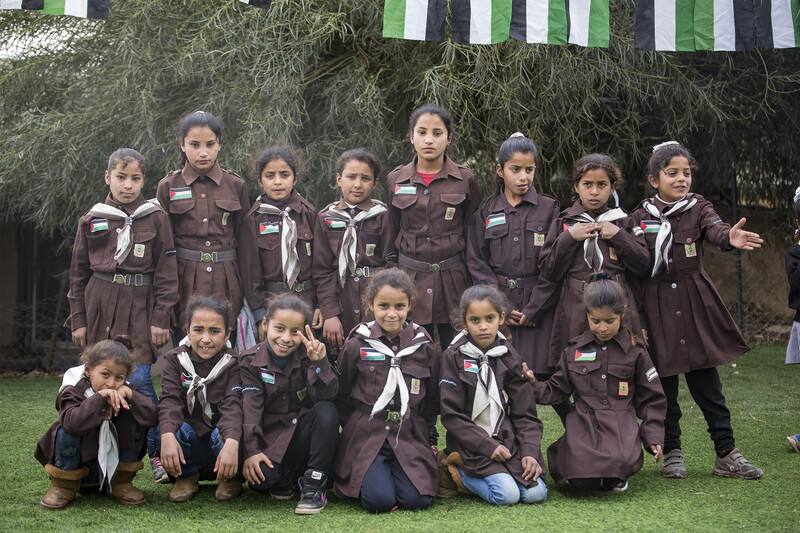Rights and Accountability
2 May 2018

Palestinian schoolchildren pose for a picture in Khan al-Ahmar. Israel is planning to demolish their school, which serves 160 children from five villages.
ActiveStills
Israel’s high court is aiding and abetting the forced displacement of residents from Khan al-Ahmar village in the occupied West Bank.
Israeli occupation authorities plan to demolish the village to expand settlements.
This is a war crime under international law, human rights groups are warning.
Israel issued expulsion orders to residents of Khan al-Ahmar multiple times in the past year, even though legal proceedings were ongoing in Israeli courts.
Israeli authorities were waiting for the high court’s blessings to complete the forcible transfer by April.
The court held its final hearing on 25 April to deliberate the fate of the Palestinian community, and announced that if residents do not submit a detailed plan to move to an alternative location by 3 May they will be forced to move to an area near the landfill of the Palestinian village of Abu Dis.
About a week before the hearing, Jamie McGoldrick, the top UN humanitarian official in the occupied West Bank and Gaza Strip, visited Khan al-Ahmar and called on Israeli authorities “to respect their legal obligations, as the occupying power, including through stopping the demolition of Palestinian-owned structures and ceasing plans for the relocation of Palestinian Bedouin communities.”
On Tuesday, Chris Gunness, spokesperson for UNRWA, the UN agency for Palestine refugees, pointed to the impossibility of the Israeli high court’s requirement that the residents of Khan al-Ahmar come up with a plan for their own displacement within a week.
“No such plans exist and the request itself is entirely unfeasible in the context of the discriminatory planning regime in Area C,” Gunness stated, noting that the residents “do not want to be compelled to relocate to an alternative site.”
Forcing already impoverished residents to move near a landfill would moreover expose them to an unhealthy environment and force them to give up their customary livelihood of herding.
“The humanitarian impact of home demolition is severe and long-lasting,” Scott Anderson, of the United Nations humanitarian monitoring group OCHA said.
“It is well documented in previous instances that the transfer of Bedouin communities into urban settings is socially and economically nonviable.”
At the hearing, the community of Khan al-Ahmar asked Israeli authorities to recognize their homes.
But the court also heard a petition filed by the far-right Israeli organization Regavim, which called for Israeli authorities to demolish the village regardless of whether or not residents have a place to live, according to the publication Palestine Monitor.
War crime
Khan al-Ahmar is home to members of the Jahalin tribe, including 32 Bedouin families, numbering more than 170 people, half of them children.
The village is located in Area C, which constitutes 60 percent of the occupied West Bank.
Area C remains under complete Israeli military rule under the terms of the Oslo accords signed between Israel and the Palestine Liberation Organization in the early 1990s.
Israel refuses to permit virtually any Palestinian construction in Area C, forcing Palestinians to build without permits and to live in constant fear that their homes will be demolished.
Khan al-Ahmar’s school was built in 2009 out of rubber tires and mud in an attempt to evade Israel’s restriction on Palestinians using cement for construction, and has been under constant threats of demolition.
It is the “only school accessible to 160 children from five villages in the area,” Human Rights Watch stated.
“The Israeli military’s refusal to issue building permits and then knocking down schools without permits is discriminatory and violates children’s right to education,” said Bill Van Esveld of Human Rights Watch. Israel has also failed to replace schools it did demolish.
Human Rights Watch is calling on the International Criminal Court prosecutor to examine school demolitions and investigate “individuals whom evidence suggests may be responsible for these crimes.”
In September, Israeli human rights organization B’Tselem warned Prime Minister Benjamin Netanyahu and other Israeli officials that they would be personally liable for war crimes if they go ahead with the demolition of Khan al-Ahmar and Susiya, a second village, to make way for Israeli settlements.
In Britain, 51 members of Parliament are backing a nonbinding motion calling on the UK government “to exert meaningful and decisive political, diplomatic and economic pressure on the Israeli authorities to halt the demolitions program as a whole.”
Decades of forced displacement
Khan al-Ahmar is located between the Israeli settlements of Maaleh Adumim and Kfar Adumim in the so-called E1 area of the occupied West Bank.
This land east of Jerusalem is where Israel plans to expand its mega-settlement of Maaleh Adumim, completing the isolation of the northern and southern parts of the West Bank from each other.
Israel forcibly relocated Jahalin families to Abu Dis in the 1990s to make way for Maaleh Adumim settlement.
All of Israel’s settlements in the occupied West Bank are illegal under international law.
If the planned expulsion proceeds, this would be the second time the community of Khan al-Ahmar is forcibly displaced.
The families were initially expelled from the Naqab region by the Israeli military in the 1950s.
Tags
- Khan al-Ahmar
- forced displacement
- E1
- Area C
- home demolitions
- forced evictions
- Kfar Adumim
- Maaleh Adumim
- B’Tselem
- bedouins
- Jahalin Bedouin
- Abu Dis
- Susiya
- Negev (Naqab)
- UK parliament
- International Criminal Court
- Bill van Esveld
- Human Rights Watch
- Oslo accords
- Jamie McGoldrick
- OCHA
- UNRWA
- Chris Gunness
- Scott Anderson
- Regavim
Source Article from https://electronicintifada.net/blogs/tamara-nassar/israeli-high-court-abets-war-crime-against-khan-al-ahmar
Related posts:
Views: 0
 RSS Feed
RSS Feed

















 May 3rd, 2018
May 3rd, 2018  Awake Goy
Awake Goy 
 Posted in
Posted in  Tags:
Tags: 

















Add new comment